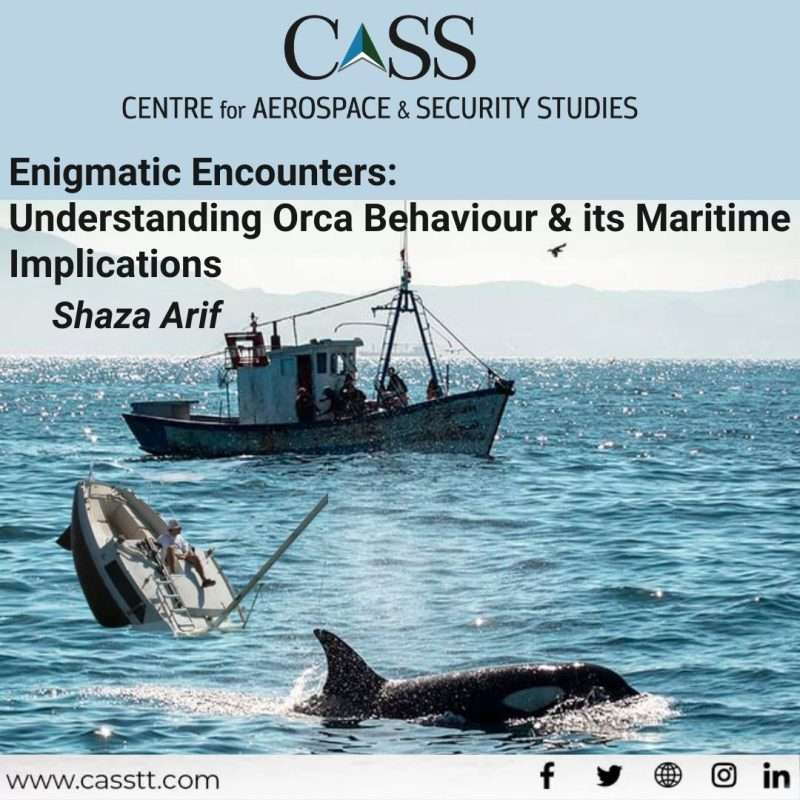Sailing from Lerwick, United Kingdom to Bergen, Norway in June this year, Dr Wim Rutten was taken aback when nearby orcas (also called killer whales) started ramming his boat. The incident was not an isolated one. It is part of a series of orca attacks occurring since 2020.
Orcas are renowned for their sharp cognitive abilities, have strong social structures and are naturally endowed with complex and collaborative problem-solving. Of late, these intelligent animals have attracted attention due to their notorious involvement in a curious and risky game. This newly observed behaviour includes chasing boats in small groups. The attacking strategy includes breaking off the ship’s rudders – the vital apparatus used to govern its direction. The latter’s dismantlement, which renders the ship immobile, marks the termination of the encounter.
These interactions have sparked growing concerns amongst the maritime and scientific communities since the frequency and intensity of the attacks have now reached an unprecedented level. In the last three years, approximately 500 ramming instances have been reported, with a significant portion (350) concentrated solely in the Iberian Peninsula. In May 2023 alone, 20 such instances were reported, further exacerbating the problem. Notably, the behaviour has been observed frequently in the waters of the Strait of Gibraltar and has been moving up north, as evidenced by the recent encounters in the Shetland Islands in Scotland. These interactions impact maritime operations, given that three vessels have sunk in southern Europe, while 250 have been considerably damaged ever since these attacks began.
The precise motive behind this strange orca behaviour remains a mystery. Various ideas have come to light. The first is that the orcas are presumably ‘just playing’, given that they are known for their lively demeanour. Their attraction to a vessel’s rudder and the subsequent impact of their actions may merely be a manifestation of their playful nature. On the other hand, a more defensive rationale has also been mentioned as a potential motive for their increased aggression. For example, the animals might have suffered some traumatic experience prompting them to display cautionary behaviour by stopping the boats from avoiding another distressing episode. This idea is rooted in social learning, whereby the younger orcas may be mimicking the observed behaviour of important members such as the matriarch Orca named ‘White Gladis’, considering it necessary for their survival. ‘White Gladis’ whom many marine experts believe started this ramming ‘trend’ of animals was apparently pregnant when she began this strange act.
The growing number of such incidents indicates a pressing need to explore the root cause of this behaviour, given that it raises concerns about the safety of the vessels and passengers on board in the targeted waters. While it is remarkably fortunate that there have been no instances where human beings have been harmed directly in the encounters with orcas, the possibility cannot be dismissed. In response to the recent occurrences, authorities in Portugal have issued directives to tourist boats, advising them to maintain a safe distance from orcas. This precautionary measure highlights the potential impact on the tourism industry in the affected regions.
Beyond the immediate concern for human safety, one’s heart goes out to the orcas themselves. Their fragile existence is deeply worrisome, with only a mere 40 left in the Strait, classifying them as ‘critically endangered’ according to the International Union for the Conservation of Nature. This incident serves as a stark reminder of the potential threats faced by the killer whale population. If future encounters turn more aggressive, it could further endanger their already vulnerable condition, adding to the challenges they endure. Their behaviour could also be a reflection of underlying stress arising from shifts in their environmental conditions or changes in their food supplies.
These attacks are a compelling call to recognise the impact of human activities on marine life and emphasise the need to ensure practices that are conducive to marine life. As a prudent step for the immediate future, it is crucial to enhance training and equip seafarers to effectively handle such potential threats posed to both their vessels and themselves. This necessitates implementing comprehensive safety measures to safeguard the boats while fostering harmonious co-existence between human beings and marine life. The lack of clarity on the issue suggests that further research is also required to minimise potential risks.
As a humane global community, we must act with both urgency and compassion to safeguard these magnificent creatures and ensure their survival, as well as the safety of those engaged in maritime practices in our precious oceans. By doing so, we can create a harmonious balance that benefits both marine life and the dedicated individuals who rely on the seas for their livelihoods.
Shaza Arif is a Research Assistant at the Centre for Aerospace & Security Studies (CASS), Islamabad, Pakistan. She can be reached at: cass.thinkers@casstt.com
Design Credit: Mysha Dua Salman




